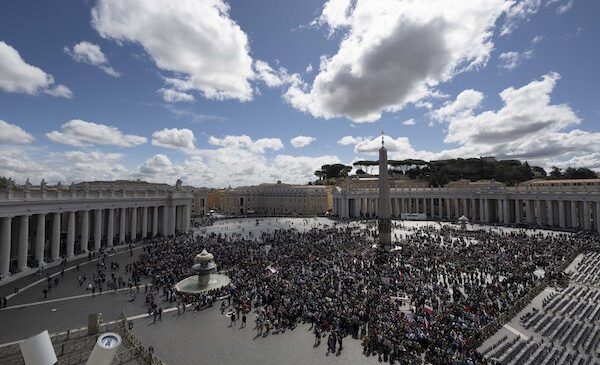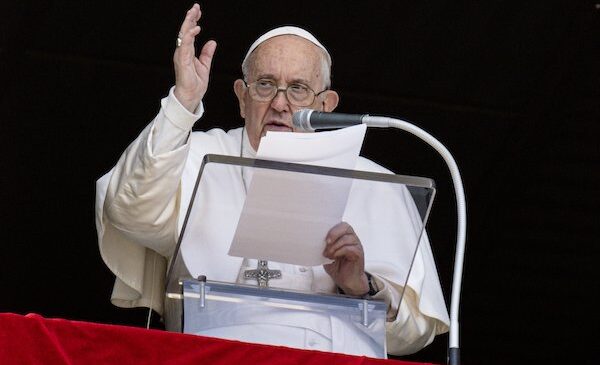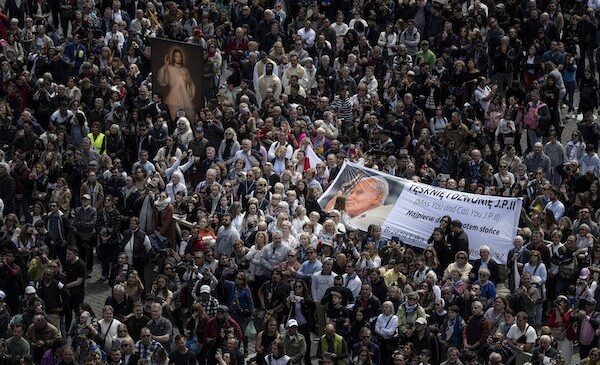By Cindy Wooden
VATICAN CITY (CNS) — The wounds of Christ, still visible after his resurrection, are the greatest sign of God’s love and mercy, Pope Francis said on Divine Mercy Sunday.
“Let us ask ourselves, however, if in the name of this love, in the name of Jesus’ wounds, whether we are willing to open our arms to those who are wounded by life, excluding no one from God’s mercy, but welcoming everyone — each person like a brother, like a sister, like God welcomes everyone. God welcomes everyone,” he said April 16.
After reciting the midday “Regina Coeli” prayer with about 20,000 people gathered in St. Peter’s Square, Pope Francis wished a happy Easter to Eastern Catholic and Orthodox Christians who follow the Julian calendar and were celebrating the Resurrection that day.
He also expressed concern about Sudan where fighting between forces loyal to two different generals has led to the deaths of hundreds of civilians since April 13. “I am close to the Sudanese people, already so tried,” the pope said, “and I invite you to pray so that they might lay down their arms and take up the path of peace and harmony.”
In his main address, Pope Francis spoke about the day’s Gospel reading, John 20:19-31, which recounts the story of St. Thomas doubting the other disciples’ claim that they had seen the risen Lord.
In his hesitation to believe the others, “he represents all of us a little bit,” the pope said. “Indeed, it is not always easy to believe, especially when, as in his case, he had suffered a tremendous disappointment” after following Jesus, believing in him, and then watching him die on the cross.
St. Thomas was not with the other disciples when Jesus appeared to them the evening after the resurrection, the pope noted.
“He had gone away from the community,” he said, and the only way he could have a chance of encountering Jesus was by going back, “returning to that family he had left behind, scared and sad.”
“Thomas wants an extraordinary sign — to touch the wounds. Jesus shows them to him, but in an ordinary way, coming in front of everyone, in the community, not outside,” the pope said. “It’s as if he said to him: ‘If you want to meet me, do not look far away, remain in the community, with the others. Don’t go away. Pray with them. Break bread with them.”
Jesus says the same to his disciples today, Pope Francis said. The community of the church “is where you will find me; that is where I will show you the signs of the wounds impressed on my body: the signs of the love that overcomes hatred, of the pardon that disarms revenge, the signs of the life that conquers death.”
Christians should ask themselves where they look for Jesus, the pope said. Is it “in some special event, in some spectacular or amazing religious manifestation, solely at the emotional or sensational level?”
Or, he said, do they look for the Lord “in the community, in the church, accepting the challenge of staying there, even though it is not perfect?”
“Despite all its limitations and failures — which are our limitations and failings — our mother church is the body of Christ,” the pope said. “It is there, in the body of Christ, that, now and forever, the greatest signs of his love can be found impressed.”




Mercy and compassion are healing and empowering. Bending low to uplift the downtrodden, Jesus exercised his healing ministry. Dr. Cajetan Coelho